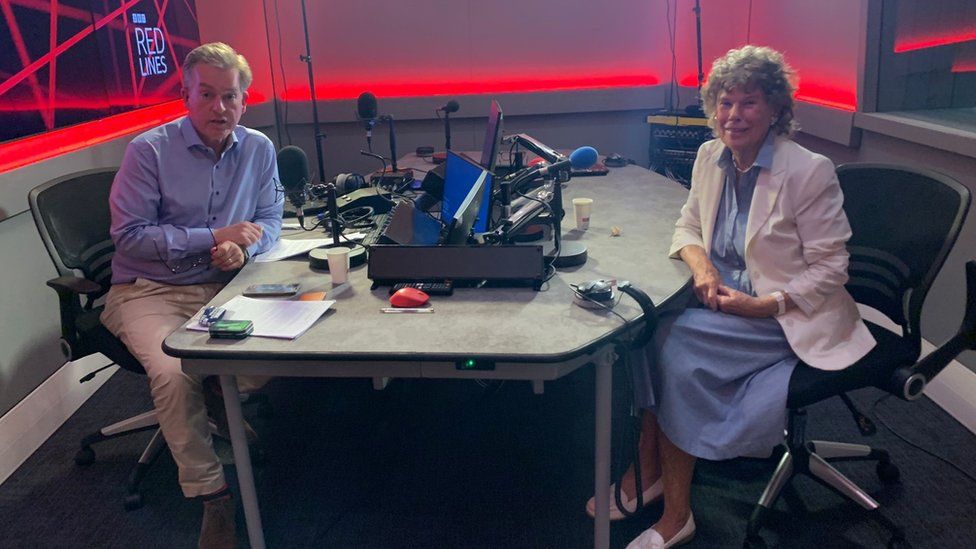ARTICLE AD BOX

Kate Hoey tells Mark Carruthers she has stayed consistent in her values while others have shifted in theirs
By Mark Carruthers
BBC News NI
How did someone who started out as an international Marxist and admirer of Bernadette McAliskey end up a leading defender of the union and arch Brexiteer?
That's the political journey taken by Baroness Hoey who, as Kate Hoey, was Labour's MP for Vauxhall for 30 years.
Her career seems full of contradictions - but that's not how she sees it.
She maintains she has stayed consistent in her values and principles while others have shifted in theirs.
The Northern Ireland-born politician, who left Labour in 2019, has told BBC News NI's Red Lines podcast that she's not concerned about the prospect of her old party winning the next general election.
"I don't think anyone from a pro-union background should fear Keir Starmer becoming the next prime minister of the United Kingdom," she said.
Despite Labour's close links to the nationalist Social Democratic and Labour Party, she points out that: "Keir Starmer has said if there was a [border] poll, he's on the record saying he'd be campaigning for the Union."
And despite what some newspaper articles have claimed in the past, Baroness Hoey is clear that she was always an unwavering unionist - even though in her youth she was a member of the International Marxist Group which campaigned at the time under the slogan of "Victory for the IRA".
She freely admits her hero in the late 1960s was Michael Farrell, a founding member of the People's Democracy movement and the man who went on to write The Orange State, a highly critical history of Northern Ireland.
Bernadette McAliskey was someone who, as a woman, "you couldn't help but admire", she says.
Image source, PA Media
Image caption,Baroness Hoey was the minister for sport in Tony Blair's government
Eamonn McCann was another young activist she regarded highly - and in a separate interview for this series, he recalls with relish the time he and Baroness Hoey were arrested at an anti-internment rally in London in the early 1970s.
When I suggest listeners might be surprised to hear about her early politics and influences, Baroness Hoey appears bemused.
"I am not tribal," she says.
Sport has always been a very big part of her life.
She was the 1966 Northern Ireland high jump champion, worked for several high profile English football clubs including Arsenal and Chelsea, and served as sports minister in Tony Blair's government.
When she attended England v Ireland rugby internationals at Twickenham in that capacity she cheered for England, even though there were fellow Ulstermen on the pitch wearing green.
She would tell those around her she wasn't supporting Ireland, "because the tricolour is not my flag...I genuinely don't feel Irish. Is there something wrong with that?"
Image source, PA Media
Image caption,DUP leader Sir Jeffrey Donaldson, Baroness Hoey, and Dame Arlene Foster outside the UK Supreme Court in London in February, where judges were delivering a ruling on the lawfulness of the Northern Ireland Protocol
On her apparent shift to the right, she is philosophical.
She remains resolute in her commitment to Brexit. "I was always very cynical about the European Union," she tells me.
So could she, I want to know, be tempted by one of the local parties to run for Stormont?
The answer is a firm no - but was she ever approached?
She says she "doesn't actually recall" being asked to stand - but concedes vague conversations may have happened.
The Traditional Unionist Voice leader, Jim Allister, is, she says "one of the most principled, cleverest politicians in Northern Ireland... but I have differences with Jim on lots of social issues".
"I have differences with even the DUP on certain things and I certainly have differences with [Ulster Unionist Party leader] Doug Beattie on a lot of things," she adds.
"What I've always campaigned for - and what I'm still campaigning for - is for the Labour Party to allow proper membership in Northern Ireland".
All of which brings us back, full circle, to where we started our conversation - to Labour and to the politics of the Left.
For those who want to pigeonhole Kate Hoey's politics, this interview may well prove frustrating. "I don't fit into a mould", she says.
You can listen to Baroness Hoey's Red Lines interview in full on BBC Sounds.

 1 year ago
65
1 year ago
65








 English (US)
English (US)